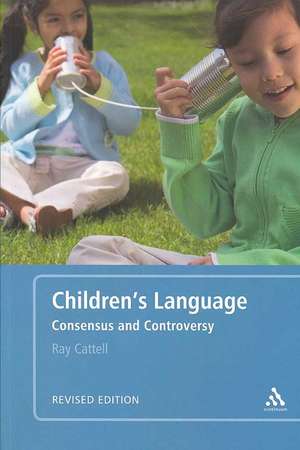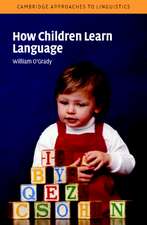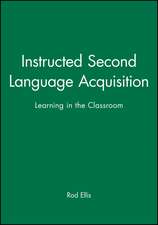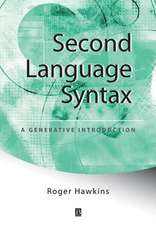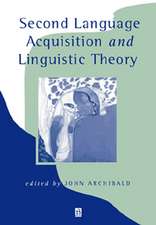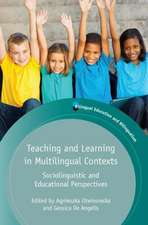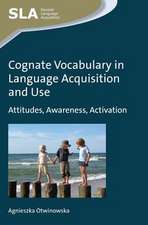Children's Language: Revised Edition: Consensus and Controversy
Autor Ray Cattellen Limba Engleză Paperback – 9 mai 2007
| Toate formatele și edițiile | Preț | Express |
|---|---|---|
| Paperback (1) | 497.13 lei 6-8 săpt. | |
| Bloomsbury Publishing – 9 mai 2007 | 497.13 lei 6-8 săpt. | |
| Hardback (1) | 1183.95 lei 6-8 săpt. | |
| Bloomsbury Publishing – 9 mai 2007 | 1183.95 lei 6-8 săpt. |
Preț: 497.13 lei
Preț vechi: 612.99 lei
-19% Nou
Puncte Express: 746
Preț estimativ în valută:
95.14€ • 98.96$ • 78.54£
95.14€ • 98.96$ • 78.54£
Carte tipărită la comandă
Livrare economică 14-28 aprilie
Preluare comenzi: 021 569.72.76
Specificații
ISBN-13: 9780826488800
ISBN-10: 0826488803
Pagini: 304
Ilustrații: Illustrations
Dimensiuni: 156 x 234 x 16 mm
Greutate: 0.46 kg
Ediția:Revised
Editura: Bloomsbury Publishing
Colecția Continuum
Locul publicării:London, United Kingdom
ISBN-10: 0826488803
Pagini: 304
Ilustrații: Illustrations
Dimensiuni: 156 x 234 x 16 mm
Greutate: 0.46 kg
Ediția:Revised
Editura: Bloomsbury Publishing
Colecția Continuum
Locul publicării:London, United Kingdom
Caracteristici
* First edition has sold 1862 copies since it was published in March 2000.
Cuprins
1. Getting started with language 2. Starting to make progress 3. Do we teach children to speak?: B F Skinner and behaviourism 4. Learning through touching and feeling: Jean Piaget 5. What goes on in the mind?: Noam Chomsky and mentalism6. A close look at Chomsky's theories 7. Do we help children to speak?: 'Motherese' or child-directed speech 8. Learning how to mean: Michael Halliday 9. The two hemispheres of the brain: their functions in relation to language10. The two hemispheres of the brain: modern discoveries 11. The bounds of language acquisition 12. Animals and language 13. New knowledge about infant knowledge 14. Bootstrapping in vocabulary15. The best of both worlds?: The work of Annette Karmiloff-Smith 16. Conclusion Glossary
Recenzii
"A revised edition of the 2000 volume of the same name, this book aims to be a text for the beginning student, focusing on areas of agreement and disagreement within the field. However, whereas it succeeds to some extent, it has a number of shortcomings...The many largely overworked debates that form the focus of the book are not matched with the many important and interesting areas of controversy in current acquisition studies....In the text is riddled with statements to the effect that explanations of particular topics are too complex to be attempted. This is intensely irritating and risks causing students to feel hopelessly disempowered. The issues either needed to be addressed appropriately for the level of the text or not be mentioned at all (or perhaps only in footnotes)...overall, this work was a disappointment. It had grand and appropriate aims, but, for various reasons, its effectiveness is compromised." -Susan Foster-Cohen, Studies in Second Language Acquisition, Vol. 30 No. 4, December 2008
"Views about the nature of language acquisition differ dramatically, and it is not easy for the uninitiated non-specialist to gain a general overview of the field and the different views and perspectives held by various researchers in the field. Cattell's Children's Language: Consensus and Controversy meets this need and provides a welcome introduction to this very important field. It is well-written, cogent and easy to follow, and does an outstanding job of introducing some very complex topics in a readily-understandable manner. Highly recommended for general readers and undergraduate students." -Choice
"Views about the nature of language acquisition differ dramatically, and it is not easy for the uninitiated non-specialist to gain a general overview of the field and the different views and perspectives held by various researchers in the field. Cattell's Children's Language: Consensus and Controversy meets this need and provides a welcome introduction to this very important field. It is well-written, cogent and easy to follow, and does an outstanding job of introducing some very complex topics in a readily-understandable manner. Highly recommended for general readers and undergraduate students." -Choice
